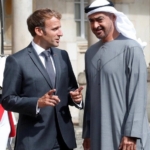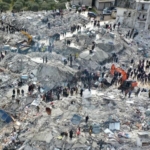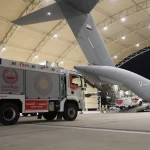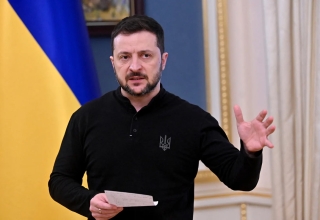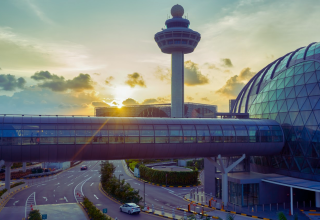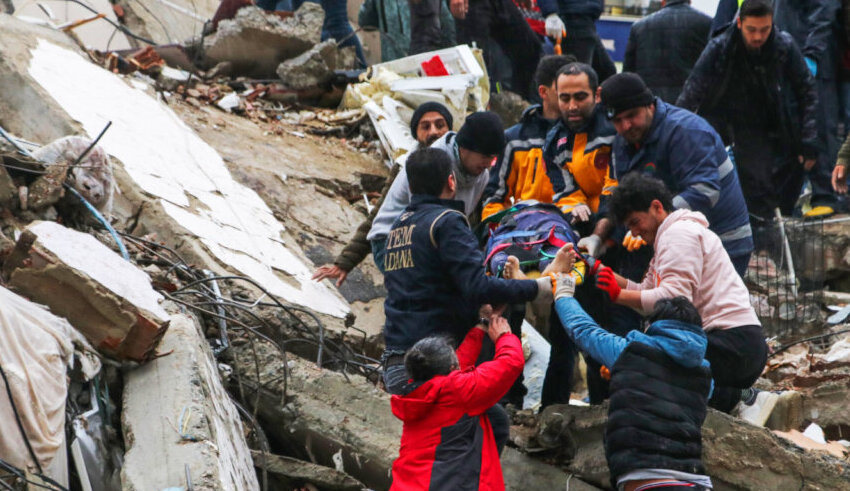
As a result of the earthquakes that occurred in Turkey and Syria a week ago, the Minister of Foreign Affairs of the United Arab Emirates has made a plea for more assistance. Sheikh Abdullah Bin Zayed Al Nahyan made the call when he was on a visit to Turkey on Sunday. While there, he traveled visited parts of the Kahramanmaras region that were severely impacted by the recent earthquakes.
The minister reportedly paid a visit to the coordination center of Turkey’s Disaster and Emergency Management Authority (AFAD), where officials briefed him on recent developments related to relief work in an effort to lessen the impact of the humanitarian crisis. The reports were published in the media.
Sheikh Abdullah is quoted as saying by the UAE Foreign Ministry that the UAE is eager to stand with the Turkish people and give the essential support and assistance for those impacted to help them get through this experience.
Following the earthquake, the United Arab Emirates started sending tents to Turkey that have the capacity to house 33,000 people. To this far, 515 huge tents, each of which has the capacity to house 16 people, have been delivered. This represents almost a fifth of the total number of tents that were planned to be provided.
Keep Reading
UAE opens largest medical center for Turkey-Syria earthquake victims
After being outfitted and welcoming medical, technical, and administrative staff, the Emirati Relief Field hospital in Gaziantep has began its work to assist earthquake victims in Turkey. This comes after the hospital received the necessary personnel to carry out its job.
The hospital is the first field hospital in Turkey to be classified as Level III according to international standards. It has a total of 50 beds, including four beds in the intensive care unit, and is situated on a land area of 40,000 square meters.
A number of Turkish authorities, as well as the United Arab Emirates Ambassador to Turkey, Saeed Thani Al Dhaheri, were present for the hospital’s opening ceremony.
According to a report by Emirates News Agency (WAM), Al Dhaheri stated that the field hospital was established upon the directives of the UAE’s leadership and embodies the country’s humanitarian approach stipulated by the ninth principle of the Principles of the 50, which highlights the UAE’s commitment to its humanitarian obligations and its keenness to stand by victims of conflicts and disasters around the world. Al Dhaheri said that the field hospital was established upon the directives of the UAE’s leadership and that it
In addition, he stated that the Emirati team had collaborated with the Turkish authorities to determine the fundamental and immediate requirements of the victims.
According to Staff Brigadier Dr. Abdullah Khadem Al Ghaithi, Commander of the Emirates Relief Field Hospital, the hospital has several departments and medical staff, such as reception, screening, emergency, surgery, critical care, dental, x-ray, laboratory, pharmacy, and outpatient sections.
He went on to say that the hospital’s medical staff includes psychologists who are able to assist patients who are suffering from anxiety, depression, and other post-traumatic disorders as a result of the natural disaster that struck the country. He went on to explain that the hospital also performs essential surgeries.
In addition, Al Dhaheri expressed gratitude to the Turkish government for the assistance they provided in facilitating the hospital’s ability to carry out its humanitarian mission.
How the UAE’s Helping Hand is always ready
The astonishing quantity of humanitarian and foreign aid provided by the UAE has brought attention to the great geopolitical ambitions of this young Gulf monarchy, which was previously referred to as a “micro state,” “tiny state,” and a “micronation” (Miller and Verhoeven 2019, also see Mendelson 1972 and Ulrichsen 2012).
Both federal state consolidation and national unification are ongoing political projects in the United Arab Emirates, and all parameters of its strategically and pragmatically crafted foreign aid policy, which is vigorously responsive to regional and global changes and challenges, are geared toward gaining international acknowledgement, leverage, recognition, and relevance (Young 2017, Barlett et al. 2017, and Henderson 2017).
In the 1970s, the founding father of the UAE, Sheikh Zayed Bin Sultan Al-Nahyan, stressed humanitarianism as a foreign policy objective and a significant component of Emirati identity (Al Mezaini 2017). Since then, it has been institutionalized as “humanitarian diplomacy” as part of the UAE’s Foreign Policy (De Lauri, 2018).
Under the Ministry of Cabinet Affairs and the Future, the Office of Public and Cultural Diplomacy was founded in 2014 as one of multiple ambitious initiatives to incorporate western practices and fulfill international standards for institutional transparency. The Office is charged with establishing an Emirati legacy in the fields of intellectual capital, culture, development, and humanitarianism (MOCAF 2019).
Humanitarian diplomacy was mentioned as the first of their “six fundamental pillars that together create the foundation of the UAE’s public diplomacy” (UAE Government Portal 2019). In recent years, humanitarian diplomacy and aid have been gradually integrated into the larger framework of a more militarized Emirati foreign policy, while being envisioned and marketed as components of the UAE’s soft power. Since 2001, the United Arab Emirates’ hitherto modest, neutral, and non-interventionist foreign policy has taken on a more assertive tone, with objectives to weaken Shi’a Iranian influence and Sunni political Islam (i.e. Muslim Brotherhood and ISIS) across the Middle East and Africa (Al Mezeini 2017).
Humanitarian aid has been a vital and strategically designed component of the country’s foreign aid to serve the commercial and business objectives of the Emirates in the Middle East, Africa, and the rest of the globe.
Given the worldwide potential to benefit on the current trend of privatization and commercialization of humanitarianism, the humanitarian aid industry has been welcomed, particularly by Dubai, as a creative 21st century company to practice.
In reacting to global geopolitical issues, strengthening internal state formation, exercising economic sovereignty with rivals and allies, and growing the UAE’s influence within the evolving international order, Emirati foreign policy has exhibited a pragmatic approach. This strategy has enabled foreign assistance to effectively create alliances, commercial partnerships, and corporate contracts on the global, Middle Eastern, and African political markets (Young 2017, Ziadeh 2019).
Read: Top 10 Valentine’s Day Gifts For Girlfriend
Indeed, the United Arab Emirates, with its expanding logistical capacities in commercial, military, and humanitarian spaces from Africa to the Arabian Peninsula and Indian Ocean, exemplifies a fascinating 21st century success story of a once-small state’s push for leverage in the shifting parameters of political economy and neoliberal governance in war and conflict zones (Ziadeh 2019, Miler and Verhoeven 2019, Henderson 2017).
